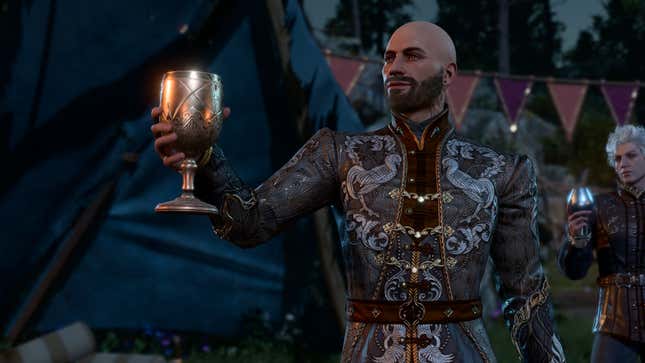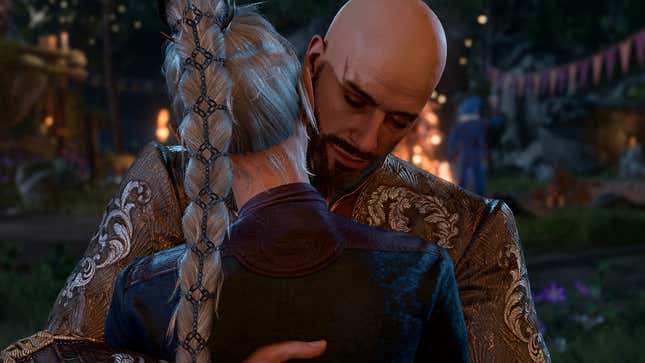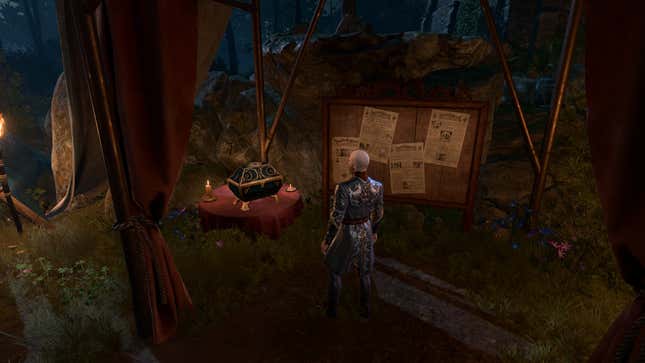
I don’t have a lot of complaints about Baldur’s Gate 3, but the original ending is probably my biggest issue with Larian Studios’ excellent RPG. Though I was content with the ways the story concluded, its rushed execution left me wanting more, which was even more readily apparent when I tried the game’s “evil” ending and it was about as fleshed out as an intrusive thought. Larian has been adding new content to the ending since launch, including a new scene dedicated to Karlach, but in Patch #5, the studio has created an entirely new epilogue that feels like the debrief the original game was missing.

What’s in the new Baldur’s Gate 3 ending?
Baldur’s Gate 3’s new ending takes place six months after the final battle against the Netherbrain and the party relinquishing the illithid tadpoles threatening to control their minds. Withers, the enigmatic skeleton crypt keeper who hangs out in your camp, has sent out invitations to you and your companions, inviting you all to a party to reconnect over a grand feast. I can only tell you what I saw in my version of the scene, as who shows up and what terms you’re on will vary greatly depending on decisions you made throughout your playthrough.
For this new ending, I used my first playthrough save from when I reviewed the game for Kotaku, and as I wrote about back then, I failed to see a few storylines through during this run. So, some characters like Halsin weren’t there to hang out and tell me about the past six months because I didn’t complete his questline. But the conversations I was able to have tugged my emotions in so many directions. Shadowheart, who I had long viewed as my Warlock main character’s little sister, gave me shit for losing my adventurer figure, but we still hugged and assured one another that no matter where our respective journeys take us, we’ll find time to reconvene over drinks.

While the tone of my reunions all had an air of nostalgia and joy, there were some dark undertones, as well. Lae’zel, who I secretly betrayed in my playthrough by sacrificing her would-be githyanki leader Orpheus in an effort to gain the upper hand in the final battle, has been dealing with the fallout. She’s become a diplomat and is trying to fight for better conditions for her people, seemingly unaware I took her ace in the hole away from her in the endgame. She misses Faerûn, but says she misses me, her friend, more. In the original Baldur’s Gate 3 ending, we parted knowing that we helped each other, but her cause had taken a hit in the process and I lied to her people to avoid accountability. I could live with what I did for the greater good, but seeing how someone who trusted me (and still does) has been affected by it, was a brutal, understated moment in what should have been a solely joyous occasion.
Baldur’s Gate 3’s new ending makes up for the original’s faults
Funnily enough, Astarion was the character whose epilogue made me painfully aware of how lacking Baldur’s Gate 3’s OG ending was. The fan-favorite vampire and I didn’t see eye-to-eye through most of Baldur’s Gate 3—in fact, I’d say he’s often my least favorite companion, but his original ending for those who don’t pursue him romantically was so bizarre it felt like he was robbed. After the final battle, Astarion loses his ability to walk in the sun, and the scene of him scrambling on the ground to find shelter is treated with all the ceremony of an “everybody laughs” ending of an old cartoon. In the new epilogue, I actually got to talk with Astarion about what it was like to lose the ability to walk among his friends in the daytime, and flesh out that moment so it wasn’t just comic relief.
In spite of him being straight up evil for much of my Baldur’s Gate 3 playthrough, Astarion somehow seems at peace in the new epilogue. He’s no longer feasting on human blood, and even if he must avoid the sun once again, he hasn’t given up hope that he’ll find a way to walk beside us again.
Then there’s Gale, my brilliant idiot Wizard boyfriend. In the original epilogue, Gale proposed to me and we agreed to move to his home in Waterdeep. But because that first ending was so rushed, I didn’t feel like I was able to define my character’s relationship with him particularly well. At the party, Gale and I reflect on our married life, and I’m given more dialogue options to choose if my hero is content with the domestic life they’ve made for themselves, or if there might be more adventures in our future. The epilogue gives me plenty of opportunities to add color to something that once felt like black-and-white line art, and that alone was worth fighting the final boss again to see.

The epilogue lets you check in on other characters in Baldur’s Gate 3 beyond your core companions. Withers apparently sent more invitations out than were accepted, so several acquaintances from across the Sword Coast responded with letters you can read in-game I was happy to hear from even those who couldn’t make it, and if I didn’t hear from them directly, I could read newspaper clippings about how the world is recovering after we defeated the Netherbrain.
And Baldur’s Gate 3’s new epilogue makes time to fill in perceived plot holes in the process. After I finished talking with everyone at camp, I spoke with Withers, and he brought up that Karlach, who was burned alive by the infernal engine implanted in her chest in my playthrough, is not here with us. Baldur’s Gate 3 players know that one of Wither’s key abilities is reviving fallen party members, and I was able to ask him why he can’t revive Karlach. He simply says she wouldn’t stand for being brought back, and I accept that answer. Karlach’s mortality is a key part of her story, and her desire to live in Faerûn is what drives her throughout the game. But if Withers were to bring her back, she’d burn up again, unless she returned to one of Dungeons & Dragons’ layers of Hell. There are ways to save her, and I’m working toward them in my second playthrough. But in this epilogue, I just get to tell Withers that she was a sister to me, and the world is lesser for not having her in it.
As I wrapped up the epilogue, gathered around a feast with all my friends,drinks in hand, it really hit me how much Baldur’s Gate 3 needed this. I don’t always want every story or game ending to be neatly tied off with a bow—more often than not, I prefer when things are left to the imagination. But Baldur’s Gate 3’s original ending felt abrupt in a way that didn’t feel like it was intentional, just felt like it ran out of time.
When it comes to choice-based games, a lot of us want the ending to offer some kind of perfect summation of who we role-played as in this world. That feels like a fool’s errand, especially in games where our decisions have drastic consequences. Baldur’s Gate 3’s ending wasn’t quite so earth-shattering, and had only a few major branching points, so this new epilogue gives you the sense that your decisions, big and small, have changed the lives of those around you. Three months later, Baldur’s Gate 3 has the ending it deserved, and now I’m just curious to see what other permutations other players will see.